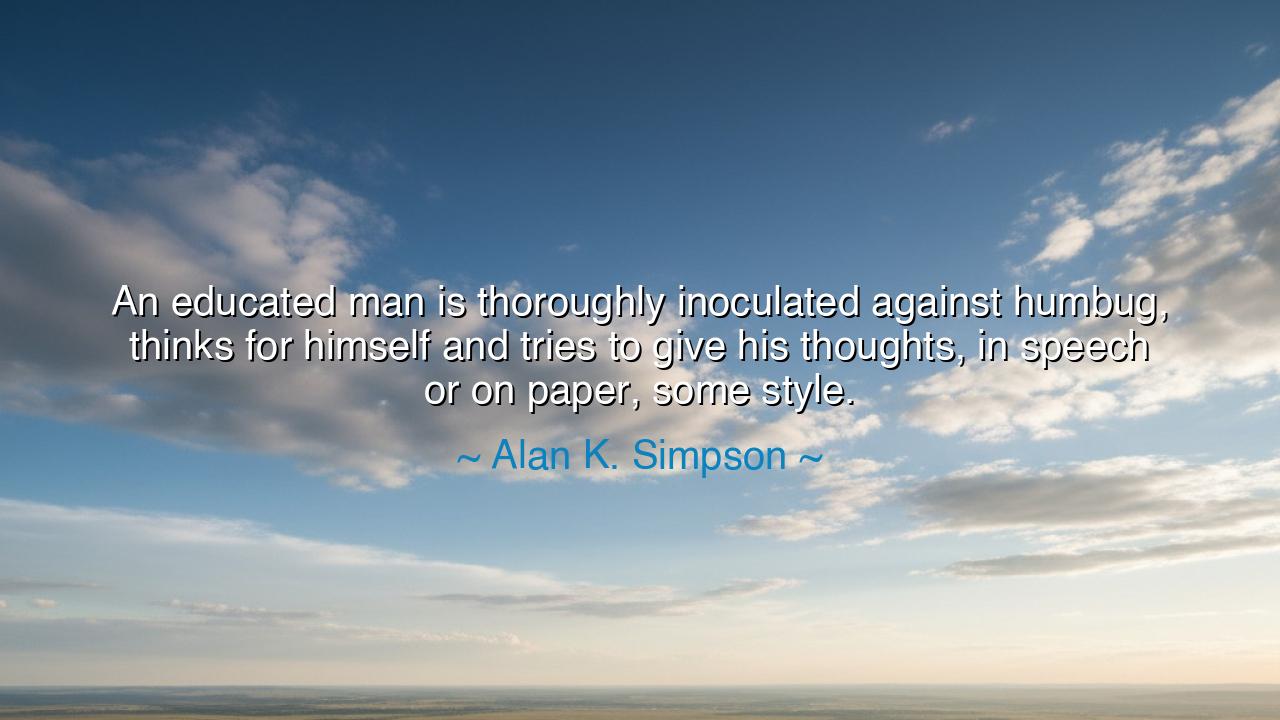
An educated man is thoroughly inoculated against humbug, thinks
An educated man is thoroughly inoculated against humbug, thinks for himself and tries to give his thoughts, in speech or on paper, some style.






In the discerning and timeless words of Alan K. Simpson, “An educated man is thoroughly inoculated against humbug, thinks for himself and tries to give his thoughts, in speech or on paper, some style.” These words, though spoken in the modern age, are born of ancient wisdom — a wisdom that knows that education is not the mere accumulation of knowledge, but the awakening of judgment, integrity, and self-expression. For the truly educated man, in Simpson’s vision, is not a vessel filled with facts, but a soul fortified with discernment. He is inoculated against humbug — immune to deceit, manipulation, and empty rhetoric. His mind is not swayed by the clamor of the crowd, but guided by reason, reflection, and the courage to think for himself.
The origin of this quote lies in the spirit of the American statesman himself. Alan K. Simpson, a U.S. senator and lifelong advocate for civic responsibility and personal integrity, often spoke of education as a moral calling. He came from a time when truth was prized above popularity, and he feared that society was growing too easily seduced by showmanship and falsehood — by what he called “humbug.” The word, old-fashioned and humorous, means deceit or nonsense disguised as wisdom. Simpson’s warning was simple but profound: that without education, people become vulnerable to the illusions of the world — to propaganda, to demagogues, to the empty glamour of words without substance.
But to be “inoculated” against humbug, as he said, is not to be cynical; it is to be wise. The educated person learns not to believe everything he hears, nor to follow every cry that stirs the multitude. He learns the discipline of critical thought — to question, to seek evidence, to recognize truth even when it is uncomfortable. In this sense, education is not merely a tool, but a shield — a defense against deception and self-delusion. Just as a doctor inoculates the body against disease, education inoculates the mind against folly. It grants a man the strength to see through falsehood and to stand firm when others are swayed by illusion.
History offers us countless examples of those who, educated in this way, became guardians of truth in times of confusion. Consider Socrates, the philosopher of Athens, who stood before his city and challenged the “humbug” of his age — the pompous rhetoric of the Sophists, who taught persuasion without morality. Socrates refused to flatter or deceive; he taught men to think for themselves, even when that truth cost him his life. His education was not confined to the classroom but lived through courage and conviction. In him we see Simpson’s ideal: a man of independent thought, immune to the seductions of falsehood, and committed to expressing his ideas with clarity and style — not for vanity, but for the sake of truth itself.
Style, in Simpson’s quote, is no trivial ornament. It is the mark of care, the sign that one’s thoughts have been shaped and refined. To speak or write with style is to honor one’s ideas — to clothe truth in language worthy of its dignity. The ancients knew this well. Cicero, the Roman orator, taught that eloquence was the companion of wisdom; that the educated man should not only think rightly but speak beautifully, for words have the power to move hearts as well as minds. To have style is to possess grace in expression, born from discipline in thought. It is the harmony between intellect and art — between truth and the music of its telling.
Yet Simpson’s teaching reaches further still: it is a call to responsibility. For in a world overflowing with voices, where every screen and speaker proclaims itself a teacher, the ability to discern humbug from truth has never been more essential. The educated person must not be passive; he must be vigilant. He must guard his mind against the easy comfort of agreement, against the false prophets of convenience. Education, then, is not a destination but a practice — a lifelong sharpening of perception, an endless refining of one’s moral compass.
The lesson, dear listener, is clear: strive to be inoculated against humbug. Seek not only to know, but to understand. Learn not only to repeat, but to reason. Let your thoughts be your own — hard-won, honest, and fearless. And when you speak or write, let your words bear the mark of care, for how we express truth determines whether it enlightens or deceives. In a world that often mistakes noise for wisdom, the truly educated stand apart — calm amid chaos, thoughtful amid frenzy, and graceful in the expression of what is just and true.
So remember the wisdom of Alan K. Simpson: to be educated is to be free — free from deceit, free from the tyranny of shallow opinion, free from the slavery of ignorance. Let your mind be your fortress and your words your art. For the one who learns to think clearly, to resist humbug, and to speak with style becomes not merely a scholar, but a guardian of truth — a light in a world that too often mistakes glitter for gold.






AAdministratorAdministrator
Welcome, honored guests. Please leave a comment, we will respond soon